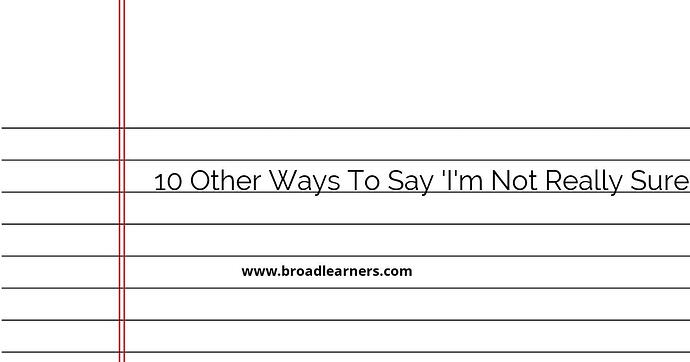When someone asks you a question and you're not really sure about the answer, it's important to respond in a polite and respectful manner. Saying 'I'm not really sure' is a straightforward way to express your uncertainty, but there are other phrases you can use to convey the same meaning. Here are 10 alternative ways to say 'I'm not really sure':
- I'm not certain
- I'm not entirely sure
- I'm not confident
- I'm not convinced
- I'm not entirely convinced
- I'm not entirely convinced about that
- I'm not completely sure
- I'm not entirely confident
- I'm not entirely convinced of that
- I'm not 100% sure
Let's take a closer look at each of these alternatives and see how they can be used in different contexts.
1. I'm not certain
'I'm not certain' is a more formal way of expressing uncertainty. It implies that you have some doubts or reservations about the answer.
Example:
Person A: Do you think it will rain tomorrow?
Person B: I'm not certain, but the weather forecast suggests a possibility of rain.
2. I'm not entirely sure
'I'm not entirely sure' indicates that you have some level of uncertainty, but not complete doubt. It shows that you may have some knowledge or information, but you're still not fully confident in your answer.
Example:
Person A: Are you familiar with this topic?
Person B: I'm not entirely sure, but I've heard some things about it.
3. I'm not confident
'I'm not confident' suggests that you lack the necessary assurance or belief in your answer. It indicates a lack of certainty or self-assurance.
Example:
Person A: Can you solve this math problem?
Person B: I'm not confident in my math skills, so I'm not sure I can solve it.
4. I'm not convinced
'I'm not convinced' implies that you have some doubts or reservations about the statement or question at hand. It suggests that you need more evidence or information to be fully convinced.
Example:
Person A: Do you think this product is worth the price?
Person B: I'm not convinced yet. I need to do more research before making a decision.
5. I'm not entirely convinced
'I'm not entirely convinced' conveys a higher level of doubt or skepticism compared to 'I'm not convinced.' It suggests that you have some reservations or hesitations about the statement or question.
Example:
Person A: Do you think we should invest in this project?
Person B: I'm not entirely convinced yet. I still have some concerns that need to be addressed.
6. I'm not entirely convinced about that
'I'm not entirely convinced about that' is similar to the previous phrase, but it specifically highlights your lack of conviction about a particular aspect or detail.
Example:
Person A: Do you believe the candidate's qualifications are sufficient?
Person B: I'm not entirely convinced about that. I think we should consider other factors as well.
7. I'm not completely sure
'I'm not completely sure' indicates that you have some level of uncertainty, but not complete doubt. It suggests that you may have some knowledge or information, but you're still not fully confident in your answer.
Example:
Person A: Are you available for the meeting tomorrow?
Person B: I'm not completely sure, but I'll check my schedule and let you know.
8. I'm not entirely confident
'I'm not entirely confident' suggests that you lack the necessary assurance or belief in your answer. It indicates a lack of certainty or self-assurance.
Example:
Person A: Can you give a presentation on this topic?
Person B: I'm not entirely confident in my presentation skills, so I'm not sure if I can do it.
9. I'm not entirely convinced of that
'I'm not entirely convinced of that' is similar to 'I'm not entirely convinced,' but it emphasizes your lack of conviction about a specific point or idea.
Example:
Person A: Do you think we should implement this new strategy?
Person B: I'm not entirely convinced of that. I think we should consider other options as well.
10. I'm not 100% sure
'I'm not 100% sure' indicates that you have some level of uncertainty or doubt. It suggests that you may have some knowledge or information, but you're not completely confident in your answer.
Example:
Person A: Do you think we'll reach our sales target this quarter?
Person B: I'm not 100% sure, but our efforts are definitely moving in the right direction.
These alternative phrases can help you express your uncertainty in a more varied and nuanced way. Remember to choose the phrase that best suits the context and tone of the conversation.
Did I miss anything? Respond below
